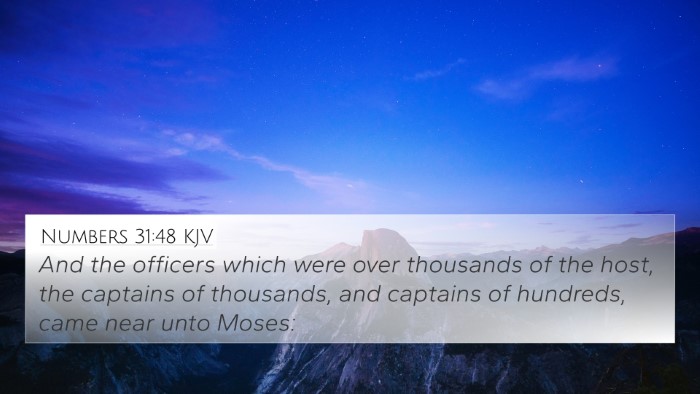Understanding Numbers 31:14
The verse Numbers 31:14 states:
"And Moses was wroth with the officers of the host, with the captains over thousands, and captains over hundreds, which came from the battle." (KJV)
Summary and Interpretation
This verse captures a moment of anger from Moses directed at the military leaders who returned from battle. The emotions expressed here highlight themes of leadership, accountability, and the responsibilities that come with the role of guiding others in conflict.
Insights from Public Domain Commentaries
-
Matthew Henry:
- Henry emphasizes the gravity of leadership and the expectation for military leaders to uphold the moral standards set by God.
- The anger of Moses is rooted in the seriousness of the task at hand and the potential deviation from divine commands.
-
Albert Barnes:
- Barnes points out that Moses's wrath was fueled by the realization that the officers might not have executed their duties faithfully according to God's instructions.
- The verse illustrates the importance of being accountable for one's actions, especially in positions of authority.
-
Adam Clarke:
- Clarke discusses the historical context that leads to this moment of wrath, highlighting the tremendous responsibility placed on military leaders.
- His commentary reflects the need for leaders to passionately care for the community they serve and maintain divine regulation in actions.
Key Themes in Numbers 31:14
- Leadership Accountability: Leaders are expected to act righteously and in accordance with God's commands.
- The Nature of Anger: Moses’s anger reflects a righteous indignation when God’s commandments are not upheld.
- Divine Justice: The seriousness of divine commands surrounding war and conduct is emphasized.
Related Bible Cross-References
- Exodus 32:19-20 - A situation where Moses exhibits anger towards the people for their sin.
- Deuteronomy 20:1-4 - Instructions on how the Israelites are to conduct themselves in battle.
- Numbers 27:16-17 - The importance of appointing leaders who shepherd the people with care.
- 1 Samuel 15:10-11 - God expresses anger towards Saul for disobedience similar to the responses of Moses.
- Hebrews 13:17 - Encouragement for the community to obey their leaders, emphasizing the weight of responsibility.
- Joshua 1:7-9 - The command to be strong and courageous, which ties back to how leaders handle their duties.
- Luke 12:48 - Where much is given, much is required, underlining the accountability of leaders.
Comparative Analysis
This verse serves as a foundation for understanding the expectations of leadership throughout the Bible. Comparisons with other scriptures highlight common themes such as righteousness, accountability, and the consequences of failing to adhere to God’s commands.
Thematic Bible Verse Connections
Several themes can be identified through the examination of this verse, connecting it to broader Biblical narratives:
- Responsibility of Leaders: Exemplified in Deuteronomy 1:15-18
- Consequences of Disobedience: Found recurrently in Romans 6:23
- Divine Instruction in Conflict: Referenced in James 4:1-2
Scriptural Cross-Referencing Tools
Utilizing various tools for Bible cross-referencing can enhance understanding, including:
- Bible Concordance.
- Bible Cross-Reference Guide.
- Cross-Reference Bible Study Methods.
Conclusion
Numbers 31:14 serves as a powerful reminder of the expectations placed upon leaders within the faith community, urging them to act according to divine will. The surrounding commentaries and cross-references illustrate a rich tapestry of themes regarding leadership, accountability, and moral integrity as pivotal to worship and community in the biblical narrative.











